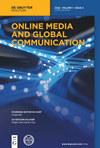Online news platforms still matter: generational news consumption patterns during the 2020 presidential election
引用次数: 0
Abstract
Abstract Purpose Gen Z or younger news audiences are believed to contribute to declining news consumption as a result of decreased news interest and reduced trust, particularly in political news. It can have adverse consequences for democratic processes. This study offers a more nuanced perspective by qualifying the role of context, and generational differences and similarities in online political news consumption patterns before and after the 2020 US presidential election, which witnessed a series of unprecedented events in the country’s history. Design/methodology/approach To investigate these patterns, I use US aggregated website visitation data from Comscore in a quasi-experimental interrupted time series design, leveraging the 2020 election as a natural experimental condition. Findings While Gen Z are indeed consuming considerably less news, contrary to assumptions, there was significantly increased engagement with news websites following the election. Additionally, media audiences across generations are likely to reduce social media use during such events. Implications Major political events can significantly influence media use patterns such as the extent of news consumption in general and political news in particular, something not often considered in media effects-oriented research. There is also an urgent need to review and reassess our definitions of news, news sources, and its audience. Originality/value By using observational data in a quasi-experimental design, this study offers a more precise and refined perspective of generational patterns of online political news consumption in the context of a major political event that both corroborates as well as challenges some our existing notions of media use.在线新闻平台仍然很重要:2020年总统大选期间的代际新闻消费模式
Z世代或更年轻的新闻受众被认为是导致新闻消费下降的原因之一,因为他们对新闻的兴趣和信任下降,尤其是在政治新闻方面。它可能对民主进程产生不利后果。这项研究通过限定语境的作用,以及在2020年美国总统大选前后在线政治新闻消费模式的代际差异和相似性,提供了一个更细致入微的视角。2020年美国总统大选见证了美国历史上一系列前所未有的事件。设计/方法/方法为了研究这些模式,我使用了来自Comscore的美国汇总网站访问数据,采用准实验中断时间序列设计,将2020年大选作为自然实验条件。虽然与假设相反,Z世代确实消耗了相当少的新闻,但选举后新闻网站的参与度显著增加。此外,跨代的媒体受众可能会在此类事件中减少社交媒体的使用。重大政治事件可以显著影响媒体使用模式,例如一般新闻消费的程度,特别是政治新闻,这在面向媒体效应的研究中通常不被考虑。我们也迫切需要重新审视和评估我们对新闻、新闻来源和新闻受众的定义。原创性/价值通过准实验设计中的观察数据,本研究为重大政治事件背景下在线政治新闻消费的代际模式提供了更精确、更精细的视角,既证实了也挑战了我们现有的一些媒体使用观念。
本文章由计算机程序翻译,如有差异,请以英文原文为准。
求助全文
约1分钟内获得全文
求助全文
来源期刊

Online Media and Global Communication
Communication, Media Studies, Internet Studies, International Studies, International Relations-
自引率
0.00%
发文量
0
期刊介绍:
Online Media and Global Communication (OMGC) is a new venue for high quality articles on theories and methods about the role of online media in global communication. This journal is sponsored by the Center for Global Public Opinion Research of China and School of Journalism and Communication, Shanghai International Studies University, China. It is published solely online in English. The journal aims to serve as an academic bridge in the research of online media and global communication between the dominating English-speaking world and the non-English speaking world that has remained mostly invisible due to language barriers. Through its structured abstracts for all research articles and uniform keyword system in the United Nations’ official six languages plus Japanese and German (Arabic, Chinese, English, French, Russian, Spanish, Japanese, and German), the journal provides a highly accessible platform to users worldwide. Its unique dual track single-blind and double-blind review system facilitates manuscript reviews with different levels of author identities. OMGC publishes review essays on the state-of-the-art in online media and global communication research in different countries and regions, original research papers on topics related online media and global communication and translated articles from non-English speaking Global South. It strives to be a leading platform for scientific exchange in online media and global communication.
For events and more, consider following us on Twitter at https://twitter.com/OMGCJOURNAL.
Topics
OMGC publishes high quality, innovative and original research on global communication especially in the use of global online media platforms such as Facebook, TikTok, YouTube, Twitter, Instagram, WhatsApp, Weibo, WeChat, Wikipedia, web sites, blogs, etc. This journal will address the contemporary concerns about the effects and operations of global digital media platforms on international relations, international public opinion, fake news and propaganda dissemination, diaspora communication, consumer behavior as well as the balance of voices in the world. Comparative research across countries are particularly welcome. Empirical research is preferred over conceptual papers.
Article Formats
In addition to the standard research article format, the Journal includes the following formats:
● One translation paper selected from Non-English Journals that with high quality as “Gems from the Global South” per issue
● One review essay on current state of research in online media and global communication in a country or region
 求助内容:
求助内容: 应助结果提醒方式:
应助结果提醒方式:


